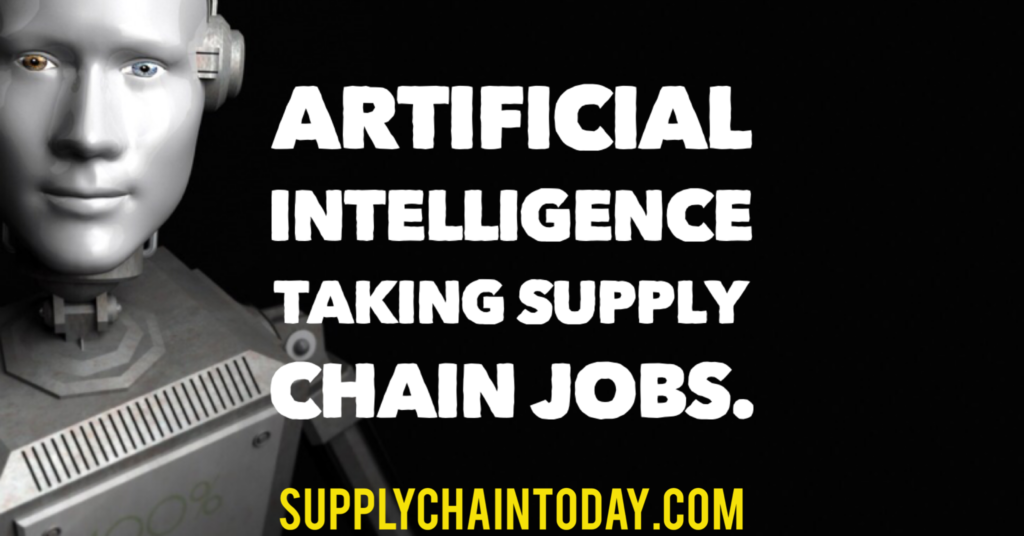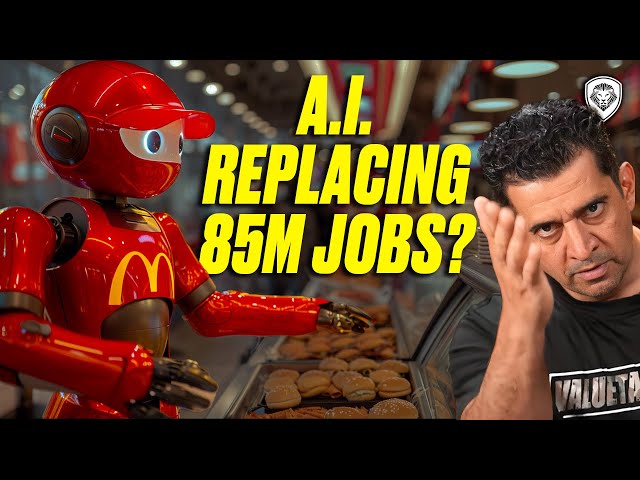Artificial Intelligence Taking Supply Chain Jobs.
Artificial intelligence will be taking supply chain jobs. It is not if this is going to happen it is when is this going to happen? Automation has been replacing people in blue collar jobs for decades. Artificial intelligence now makes it possible to replace people in white collar jobs. These are jobs that were once thought only people could do. With the ability of artificial intelligence to learn and adapt every job could be susceptible to be replaced by a “robot.” Here is a quote by Jack Ma, the founder of Alibaba, to sum up the ability of AI “In 30 years, a robot will likely be on the cover of Time Magazine as the best CEO. Machines will do what human beings are incapable of doing. Machines will partner and cooperate with humans, rather than become mankind’s biggest enemy.”
“We are approaching a time when machines will be able to outperform humans at almost any task. I believe that society needs to confront this question before it is upon us: if machines are capable of doing almost any work humans can do, what will humans do?” ~Moshe Vardi. An easy example of this is driving. In the not so distant future truck drivers, bus drivers, Uber drivers… will be replaced by self driving vehicles. This will be happening within the next 10 years. The people in these fields need to start expanding their skillsets soon.
You’re Either Automating or Being Automated
Here on Supply Chain Today we have a great deal of information on artificial intelligence and automation. The question has been asked several times of why so much time is spent on artificial intelligence here on Supply Chain Today. This quote by Tom Preston-Werner sums it up: “You’re either the one that creates the automation or you’re getting automated.” The more people understand artificial intelligence the quicker they will be able to adapt to changes in the future. In the early 2000s eprocurement started to take the jobs of simple procurement transactions. Many buyers moved into strategic purchasing. Now the same thing that happened with simple procurement transactions will happen with strategic buys. COVID-19 has increased automation efforts in many companies. Here is a great simulation video on a completely automated distribution center. Hopefully these examples will provide enough information to get people thinking if their position could be replaced by a machine in the near future.
Be Prepared for Automation
If there is a special project regarding automation jump at the opportunity. Expand your skills. Get better dealing with change. Here is a book that is highly recommended for dealing with change: Who Moved My Cheese? Here is a video if you prefer to watch – Who Moved My Cheese? Not saying you need to go out and become an expert in robotic process automation (RPA), AWS or artificial intelligence. Learn a bit about technology so if there is a chance to partake in a special project you are ready to do so. Below you will find various videos on the basics of big data, AI, machine learning, IoT, cloud computing, AWS and much more.

It is possible that artificial intelligence (AI) could potentially impact employment in the supply chain sector, as it has the potential to automate certain tasks and processes. However, the extent to which AI will impact employment in the supply chain sector will depend on a variety of factors, including the rate of technological advancement, the adoption of AI by businesses, and the regulatory environment.
Here are a few examples of how AI could potentially impact employment in the supply chain sector:
- Automating tasks: AI has the potential to automate certain tasks in the supply chain sector, such as data entry, scheduling, and inventory management. This could potentially lead to the replacement of some human workers with AI-powered systems.
- Improving efficiency: AI has the potential to improve the efficiency of supply chain processes, by enabling the automation of certain tasks and the optimization of others. This could potentially lead to increased productivity and the need for fewer workers.
- Creating new job opportunities: While AI may potentially replace some jobs in the supply chain sector, it could also create new job opportunities. For example, the development and deployment of AI-powered systems may require the hiring of workers with specialized skills, such as data scientists or machine learning engineers.
Overall, it is possible that AI could potentially impact employment in the supply chain sector, both by automating certain tasks and by creating new job opportunities. The specific impact of AI on employment in the supply chain sector will depend on a variety of factors.
Automation Taking Jobs
- 5 Mind-blowing Artificial Intelligence Tools.
- Best Artificial Intelligence Quotes.
- Best ChatGPT Quotes.
- ChatGPT Can Write better Code Than Me.
- Cloud Computing In 6 Minutes.
- Crash Course Artificial Intelligence. What is AI?
- Digital Supply Chain Basics – IoT, Big Data, Machine Learning…
- Elon Musk: Artificial Intelligence Will Take Over in 5 Years.
- Future of Work: Will AI Empower or Rule Us? | Jeff Bezos | Elon Musk | Jack Ma.
- How ChatGPT Can Make You A Better Developer.
- How Robots are Stealing Human Jobs and threatening our Future?
- Learn to Innovate Supply Chain in an Hour.
- OpenAI’s ChatGPT Explained.
- Robots And Artificial Intelligence: The Future Is Automated And Every Job Is At Risk.
- Supply Chain Automation Quotes.
- What Is AWS? Amazon Web Services For Beginners.
- What Is RPA – Robotic Process Automation.
- Will My Job Disappear? Automation, AI and Robots.
- Will Robots and Artificial Intelligence replace Human jobs by 2030?


